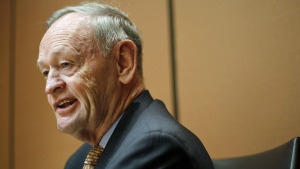
Chretien: Gun Registry, Kyoto and Wheat Board are Dismantled… What’s Next?

Chretien’s warning included a list of policies that may be next on the Conservative to-do list. These policies included the scrapping of abortion rights and same sex marriage, and the return of the death penalty.
“Unless we are bold. Unless we seize the moment. Everything we built will start being chipped away. The Conservatives have already ended gun control and Kyoto. Next may be a woman’s right to choose, or gay marriage. Then might come capital punishment. And one by one, the values we cherish as Canadians will be gone.”
Jean Chretien in a toughly worded fundraising letter to the Liberal Party
Chretien goes on to list even more hot-button issues in an effort to strike a nerve within Liberal ranks to do something. Chretien told them that when he was first elected in 1963, there was no Medicare, Canada Pension Plan, Canadian Flag or Charter of Human Rights. Chretien told them that had Harper been in power in 2001, Canada would have joined the United States in the American invasion.
He also reminded Liberals of their deficit-slaying, strong economy reputation – which happened while he was PM. Look around, do you see a surplus with the Conservatives who are supposed to be ‘prudent economic managers’?
The Liberals are taking pages out of their old playbook and pages that the Conservatives have used to mobilize their base.
Meanwhile, Liberal Leader Bob Rae reports that this tactic has been working and that revenues are starting to flow back in and the party is getting stronger.
Chretien isn’t the only one appealing to Liberals, Paul Martin also made an appeal to Liberals, though not as sharp as Chretien’s.
Paul Martin lent a definition: “Liberals stand for fairness, responsibility, and equality. Liberals believe that individual freedom is only possible in a just society, and that good government can bring us together to build a more prosperous, more sustainable, more united Canada, one that leads by example on the world stage.”
Time will tell how the Liberals will rebuild and define themselves, but it is likely that they will open the doors to the public as they lean toward a primaries system to choose leaders and the likes, rather than keep these decisions reserved to key members.




